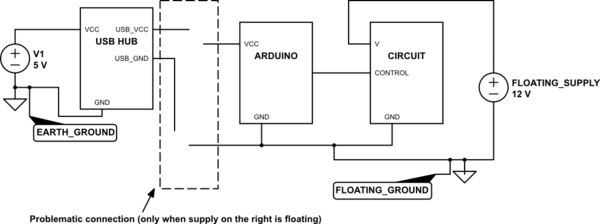I have a somewhat complex circuit controlled by an Arduino, which is supplied by a self powered USB hub (earth grounded 5V supply). A part of the circuit has to be powered by 12-20V DC.
When I plug in a earth-grounded supply to provide 12+V, everything works as expected. When I provide the 12+V through a floating supply, instead, and then connect the Arduino's USB to the hub, sometimes the hub 'bricks' and I have to disconnect and reconnect it to make it work again.
Arduino's ground (hence the hub's ground) and the ground of the other supply are joined in a single ground point. I am absolutely sure I'm not exceeding any of the Arduino/power supplies/hub current ratings.
So my question is, is it possible that connecting a floating supply to an earth grounded circuit, when the former is already powered on, could cause some voltage spike/imbalance or wreak havoc in the entire circuit?
P.S. A super-simplified schematic to show the situation:

simulate this circuit – Schematic created using CircuitLab
